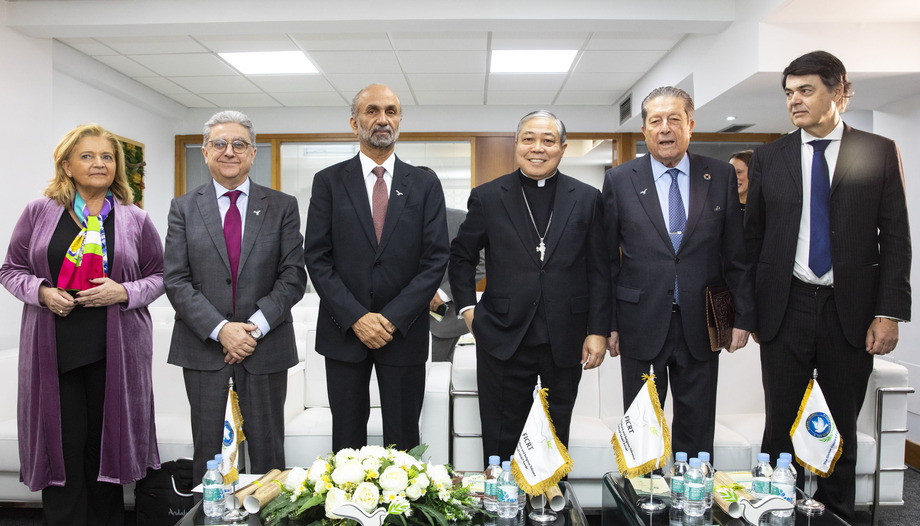In the Spanish capital, the initiative has been taken by the Foundation for Islamic Culture and Religious Tolerance (FICRT), with the participation of its chairman, Ahmed Al Jarwan, who also chairs the Global Council for Tolerance and Peace (GCTP), who hosted the event, which was attended by His Holiness' nuncio, Archbishop Bernardito Auza; the deputy ambassador of the UAE, Ali Al Nuaimi; and other personalities.
Ahmed Al Jarwan underlined the historical importance of the Document Bernardito Auza, who recalled that Pope Francis is convinced that "the decisive stage that was inaugurated in Abu Dhabi will continue to bear fruits of friendship and dialogue in the spirit of universal fraternity".
One of the consequences of the Document was the resolution with which the United Nations General Assembly decided "to proclaim February 4, starting in 2021, as International Day of Human Fraternity, in order to further mobilize the efforts of the international community to promote peace, tolerance, inclusion, understanding and solidarity".
"The great challenge of our time"
Another immense fruit, Monsignor Auza emphasized, "is the encyclical "Fratelli tutti" (Brothers All), signed by the Pope on October 3, 2020 in Assisi, the city of St. Francis," which calls for "authentic dialogue," which implies "the ability to respect the point of view of the other."
"The interreligious and intercultural dialogue between the Holy See and the Catholic Church, and the Islamic religion and the Arab world, continues to be sincere and fruitful. Both Muslims and Christians believe that this dialogue is today more necessary than ever," added the nuncio, who cited St. Francis of Assisi, and trips of the Holy Father to Egypt and Morocco, stressing that "in the pontificate of Pope Francis this dialogue has made historic progress."
He also recalled that, according to the Pontiff, "true human fraternity is the great challenge of our time." "May we, believers and non-believers, bear witness to our belonging to the one human family, fratelli tutti, brothers all," he concluded.
"Making the Document known"
A few minutes later, the Delegate for Interfaith Relations of the Archbishopric of Madrid, Aitor de la Morena, representing the Archbishop, Cardinal José Cobo, recalled one of the final points of the Abu Dhabi text, in which "Al-Azhar and the Catholic Church ask that this Document be the object of research and reflection in all schools, universities and institutes of education and training, so as to help create new generations that bring good and peace, and defend everywhere the rights of the oppressed and the last".
De la Morena referred to the educational commitmentIn a recent meeting with seminarians in Madrid, he revealed that "none of the seminarians with whom I spoke had read the Document, and some did not even know of its existence. I also ask myself: how many Catholic religion teachers have spoken to their students about this Document, or about its content and what it means?"
The question is whether we are doing enough. In his opinion, "no, we are not". On the occasion of these five years, "within the Catholic Church, in the archbishopric of MadridWe surely have to do much more to make this Document known". We are committed to the promotion of fraternity and peace, but "a very valuable means" could be this Document, and this is how the seminarians saw it when I presented it to them, said Aitor de la Morena. "We can all do much more to make the Document known".
"Peace is possible", "si vis pacem, para verbum".
Father Ángel, president of the NGO Mensajeros de la Paz (Messengers of Peace), who spoke at the event, launched an optimistic message when he said that "peace is possible" and that "this can be fixed". He also recalled the scene of Pope Francis kneeling before African political leaders, asking them to please work for peace, because "we are all brothers and sisters, children of God".
For his part, Federico Mayor Zaragoza, former director general of UNESCO and former minister, who was awarded for his career in defense of peace, referred to the fact that "every human being is the solution, because he is capable of creating, of being an actor", and proposed in his words to transform the well-known phrase "Si vis pacem, para bellum", into "si vis pacem, para verbum", that is, "if you want peace, prepare the word".
The event was also attended by parliamentary representatives such as Carlos Rojas (Congress) and María Jesus Bonilla (Senate), Enrique Millo (Junta de Andalucía), and other speakers such as Lorena García de Izarra (Fundación Tres Culturas del Mediterráneo), or Said Benabdennour, president of the Abraham Forum for Interreligious and Intercultural Dialogue in Spain.
Daily compass
In the past few days, the following have taken place in Abu Dhabi a series of conferences, activities and celebrations commemorating the fifth anniversary of the Document on Human Fraternity. The Prefect of the Dicastery for Interreligious Dialogue, Cardinal Michelangelo
Ayuso Guixot, referred at various times to the role of religions in promoting and building peace, and reiterated his words of January 31. "The document on human fraternity represents not only a map for the future, but also a compass in the daily commitment of people of different religions and of good will to work together for the benefit of every woman and every man."







